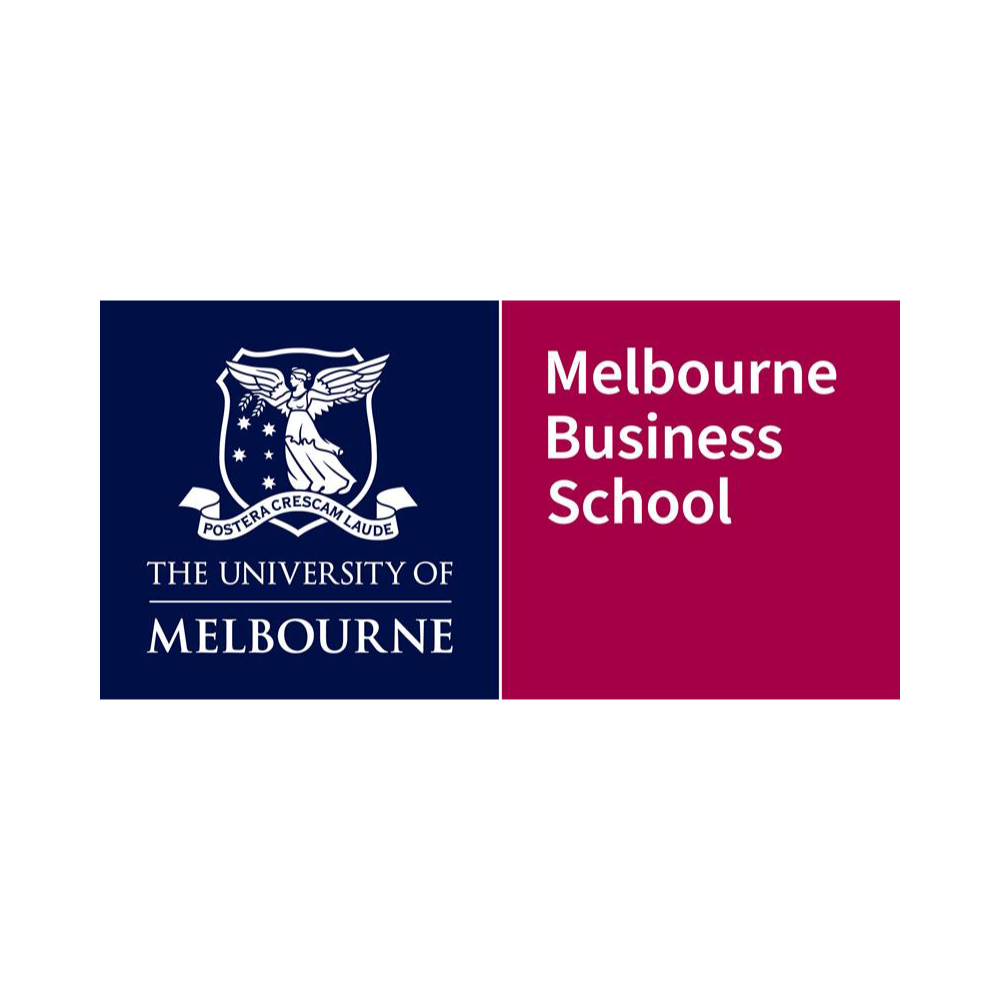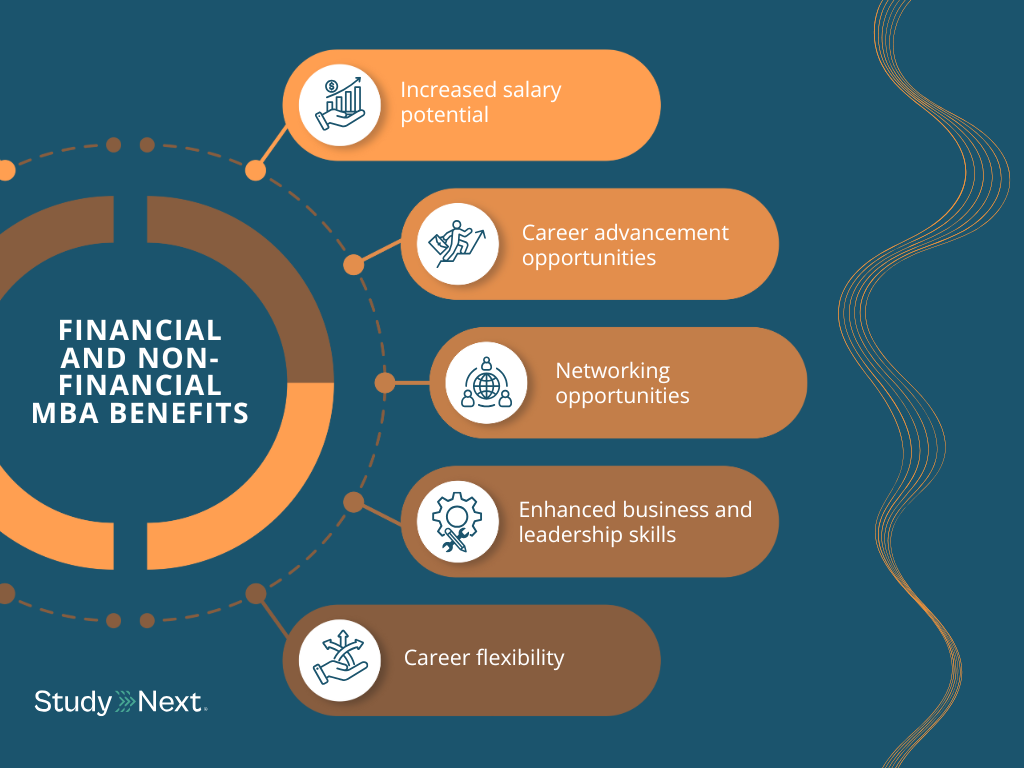In This Article
- Perception of MBAs among business professionals in Australia
- Is there an ROI on studying an MBA?
- Which Australian MBAs are worth the ROI?
- Cost considerations of an MBA
- How the study mode of an MBA affects ROI
- How the length of an MBA affects ROI
- Financial and non-financial MBA benefits
- How to reduce your MBA cost
- MBA alternatives to consider
- Invest in your professional journey with an MBA

A Master of Business Administration (MBA) is a highly regarded qualification in the business world, offering diverse benefits like increased earning potential, career advancement opportunities and access to professional networks. At the same time, it often requires a significant investment of time and money. Determining the return on investment (ROI) in MBA programs usually requires evaluating the total MBA cost against both the financial returns and the long-term career impact it can deliver.
In this article, we delve into the true value of an MBA and highlight some of the top MBA courses that can offer a strong ROI in Australia. You’ll also learn key factors that can influence your MBA’s ROI, including cost, duration, study mode as well as financial and non-financial post-MBA benefits.
Perception of MBAs among business professionals in Australia
Many business professionals in Australia consider pursuing an MBA as a valuable and strategic step towards career advancement, especially those targeting leadership and management roles. The qualification helps them develop their business acumen while demonstrating their ambition and readiness to take on greater responsibility. The prestige of holding an MBA may also positively influence how professionals are perceived in the workplace, potentially elevating their professional reputation and highlighting their leadership potential.
This positive sentiment is also backed by recent national higher education data. According to the Graduate Outcomes Survey 2024, which is conducted four to six months after students complete their studies and is funded by the Australian Government Department of Education, 78.8 per cent of domestic postgraduate business and management graduates felt their course prepared them well or very well for their current role. This figure rose to 80 per cent among those in managerial or professional roles, highlighting how postgraduate business and management studies, including MBAs, have high career relevance and impact among Australians.
Is there an ROI on studying an MBA?
Yes, an MBA usually offers a positive ROI, but its true value is highly subjective and depends on your personal and professional circumstances. Before committing to this qualification, it's important to estimate your total investment, including tuition fees, living expenses and income loss if you reduce work hours or leave work temporarily to study. In Australia, the average cost of an MBA in 2025 is around $60,000, including both online and on-campus programs. Since it’s a significant financial commitment, it’s crucial to determine whether you’re at the right stage in your professional journey to advance your study.
Your career goals play a major role in determining the ROI in MBA programs. Whether you're aiming to transition from a mid-level to a senior leadership role, switch industries, boost your salary or expand your professional network, having clear objectives helps you assess the true worth of the degree. If you have just started your career in the business world, an MBA can offer access to internships, career support and valuable connections, giving you a competitive edge.
An easy way to estimate your financial ROI is to compare the total cost of your MBA studies with your forecasted post-MBA salary. Researching average salary ranges for jobs you aspire to can provide you with a realistic sense of potential earnings. However, keep in mind that actual figures may vary depending on various factors like your pre-MBA salary, industry and geographic location.
So, is an MBA worth it in Australia? For many business professionals, the answer is yes. An MBA can be a transformative experience that equips you with the insights, confidence and connections to thrive in today’s competitive business world.
Which Australian MBAs are worth the ROI?
Several MBA programs in Australia have the potential to offer strong ROI, including those from the University of New South Wales (UNSW), the University of Melbourne, Macquarie University, the University of Sydney, the University of Queensland (UQ) and the University of the Sunshine Coast (UniSC). These courses offer diverse benefits, such as advanced skill development, networking opportunities and solid graduate outcomes, that can help justify the investment. Find out more below:
AGSM Master of Business Administration (General) – University of New South Wales (UNSW)
This online MBA at UNSW can offer a compelling ROI when considering its cost, flexibility and employment outcomes. With an indicative total fee of $68,500 in 2025, the online program is significantly more affordable than the full-time on-campus AGSM Master of Business Administration course, which costs $85,500, making it a more cost-effective option. Its part-time delivery, spanning two to four years, also allows you to continue earning while studying, reducing the financial strain often associated with full-time MBAs. This flexibility is ideal for working professionals who want to upskill and transition into leadership roles without pausing their careers.
The employment outcomes for MBA graduates at UNSW also suggests the course’s strong ROI. According to the Class of 2023 data, 87 per cent of graduates secured employment within three months of graduation. 42 per cent of them also saw a salary increase when comparing their average starting salary post-MBA to their pre-MBA income, demonstrating the financial benefits of completing the course.
UNSW’s reputation for producing high-quality graduates in business and management is also acknowledged in the Australian Financial Review (AFR) BOSS Best Business Schools 2025 rankings, where it placed second in the career impact category. This highlights a promising ROI for students aiming for long-term career advancement through this qualification.


The AGSM Master of Business Administration (MBA) is a full-time, accelerated degree designed to prepare students for senior leadership roles across the private, public and not-for-profit sectors. Expand your skill set for the future through active learning experiences while unlocking the practical tools you’ll need to thrive in your professional endeavours.
Gain insights from renowned academics and industry leaders in the corporate, government, and not-for-profit sectors. Through their teachings of contemporary foundational and elective courses, your studies will focus on strategy, finance and marketing, innovation, entrepreneurship, digital transformation, technology and social impact.


This Master of Business Administration (MBA) course is designed for professionals seeking an array of intellectual tools and frameworks to manage business and lead people, particularly where aspects of management intersect with changes in business and society.
The MBAX (General) is designed to help working professionals and aspiring leaders take the next step in their leadership careers. It offers the flexibility to study electives across a range of topics to develop a wide scope of expertise.
The program comprises core subjects and electives, all guided by industry professionals, giving you the flexibility to tailor your studies to your interests. You'll have the option to learn in various formats, choosing from online and face-to-face learning – or a combination of both.
Master of Business Administration – University of Melbourne
While this MBA at the University of Melbourne comes with a premium price of $112,500 for the full program in 2025, its reputation and long-term career impact make it a popular choice among many business professionals in Australia. The full-time course at Carlton spans over two years, providing you with the opportunity to fully immerse yourself in the MBA experience. You’re also given the choice to accelerate your studies, providing you with more time for exchange opportunities, internships and other career development experiences.
If you’re curious about the advantages of studying an MBA on campus, you can gain insights from a University of Melbourne MBA student in this article.
However, if you prioritise cost-efficiency and flexibility when calculating ROI, the university also offers an online Master of Business Administration, which has a lower indicative total program fee of $90,090 in 2025. Since it’s online, you can save time and money on travel and accommodation, making it ideal for balancing career and study.
This MBA is highly regarded in Australia, ranked #1 in the QS Global MBA Rankings 2026 and recognised as the top business school in the AFR’s 2025 list. This prestige is also reflected in its graduate outcomes, with 94 per cent of graduates securing jobs that meet their expectations within three months after completing their studies. The university has a strong MBA network with over 10,000 alumni, with 90 per cent reporting career fulfilment. Whether you choose to study on campus or online, this MBA can offer a transformative experience that delivers both short-term gains and long-term career satisfaction.


Designed with a focus on practical skills for any business application, the full-time Master of Business Administration (MBA) offers a breadth of knowledge, tools and opportunities to apply what you learn in a real-world setting.
You can choose to study over two years, embracing the full MBA experience or accelerate your pace to move through your subjects quicker, allowing more time for internships, exchange opportunities and career development.
Flexible Length
The program pace can be tailored to match your needs. Study for over two years, embracing the full MBA experience or accelerating your pace to move through your subjects quicker, allowing more time for internships, exchange opportunities, and career development.


Developed in line with global best practices, the Melbourne Business School Online Master of Business Administration (MBA) has a rigorous and comprehensive offering of subjects that will prepare you for important and demanding careers, both domestically and internationally.
Supported by the best in business and connected to a network of like-minded professionals, the online MBA program prepares you to ignite ideas, lead organisations and meet change head-on.
Master of Business Administration – Macquarie University
Macquarie University’s MBA can provide an attractive ROI for experienced professionals aiming to elevate their careers or pursue entrepreneurial ambitions. With an estimated annual fee of $48,400 in 2026, the program can be completed over one and a half to two years full-time. It also provides flexible part-time and off-campus options that can help professionals juggle study with work and personal commitments.
Macquarie’s MBA is designed for individuals who have already demonstrated leadership potential and are ready to take the next step. The curriculum focuses on advanced business skills that are essential for navigating complex business environments and driving organisational growth, with units like Finance for Business Leaders, Managing People, Marketing Management and Business Strategy. For seasoned professionals aiming to venture into entrepreneurship, this program also offers insights that can help you launch and manage a business.
If you’re looking to study an MBA that can shape the trajectory of your career significantly, you should consider this course. In 2024 and 2025, Macquarie Business School was ranked #1 in Australia for career impact by the AFR, reflecting the program’s effectiveness in helping graduates achieve meaningful career progression, whether through promotions or successful business launches.


With the Master of Business Administration, you can become a manager. Designed to challenge and transform, the MBA admits you into a diverse and highly experienced cohort that's industry-focused. Taught by handpicked academics and experts who bring innovative knowledge and research to the classroom, the degree ensures you build robust connections with industry – and see an impact on your own work. Your leadership skills and personal development will skyrocket with many opportunities to support your growth, including psychometric testing and one-on-one coaching. Additionally, the degree presents an outstanding opportunity to build on the knowledge you may have gained in a graduate diploma, certificate, or microcredential.
The MBA is primarily delivered at our City Campus. However, some units are offered at our Wallumattagal Campus in Macquarie Park or online. To complete the degree, you may need to attend classes at both campuses and/or online.
Master of Business Administration – University of Sydney
The University of Sydney’s MBA can offer a strong ROI, especially for a business professional with three or more years of experience who’s ready to enter a senior management role. With an indicative annual fee of $47,400, the program is offered exclusively in part-time mode, spanning two and a half to three years. This flexible study mode allows you to focus on your studies without leaving your career, minimising opportunity costs and enabling you to apply your learning at work immediately. As this course is conducted on campus, you’ll also benefit from real-time interactions with peers and faculty, keeping you engaged throughout your studies while expanding your professional network.
If you want to obtain a globally respected MBA qualification, the University of Sydney stands out as the only business school in Australia in the prestigious CEMS global network of business schools. It also ranked #2 in university reputation in the AFR BOSS Best Business Schools list in 2025, highlighting its great influence in Australian higher education.
The reported financial outcomes from this MBA are impressive as well. In 2024, the Financial Times revealed that this institution’s MBA graduates reported a salary increase of 108 per cent compared to their pre-MBA earnings. With its blend of academic prestige, flexible study mode and strong post-MBA salary outcomes, this program represents a strategic investment for business professionals ready to lead.


The Executive Master of Business Administration gives you a range of unique experiences around the world in different countries and organisations. Your journey will take you across Australia, to England, Europe, Asia and the United States. Because the university believes that to influence the world, you need to be inspired by it.
This course has been specifically designed for senior executives with at least 10 years of experience. The program is ideally suited for seasoned professionals ready to extend their influence.
You will complete core units according to a prescribed schedule of study to facilitate progressive learning, comprising self-directed online primers, a major strategic project and five two-week residential blocks held in Australia and overseas.
Master of Business Administration – University of Queensland (UQ)
If you’re seeking a fast-tracked and immersive MBA experience with long-term career benefits, you can consider pursuing UQ’s MBA course. Delivered on campus over 18 months full-time, the program is ideal for those who want to complete their MBA studies quickly and start capitalising on the post-MBA rewards.
While the cost may seem steep at first glance, with an indicative annual fee of $60,576 in 2025, this course is packed with valuable perks that can help justify the investment for some students. This MBA focuses on developing future-focused leadership skills in business and includes opportunities for you to work on real industry projects. You can also tailor your learning experience according to your career ambitions at UQ, whether that means conducting a research project, exploring entrepreneurial initiatives or integrating your own workplace projects into your studies.
After completing your studies, you can still enjoy a wide range of MBA benefits as a graduate, as UQ offers lifelong access to one-on-one career support and exclusive career events and resources. Ranked 3rd in Australia in the AFR BOSS Best Business Schools list for both 2024 and 2025, UQ is recognised for its excellence in business education. If you’re looking to accelerate your leadership journey and maximise your career potential, this course offers a powerful investment


The Master of Business Administration (MBA) is designed to give you a comprehensive understanding of multiple business functions and help you increase your confidence to make complex business decisions. You'll learn with an experienced cohort who will enrich your studies and connect you with ongoing career opportunities.
Design your own customised program to gain maximum value. Align your learning experience with your interests and career goals, pursue a research project or even explore topics outside the MBA.
You can incorporate your own workplace projects into your studies for applied learning opportunities, work with industry clients on solutions to real challenges, or explore your entrepreneurial projects.
Master of Business Administration – University of the Sunshine Coast (UniSC)
This UniSC course provides one of the most affordable pathways to an MBA qualification in Australia, making it an attractive option for cost-conscious prospective students. With an indicative 2025 fee of $28,968, potentially reducing it to just $16,992 if you secure a Commonwealth supported place (CSP), this program provides significant savings while still maintaining a strong focus on quality.
The UniSC MBA is available both online and on campus over an 18-month duration, giving you the flexibility to choose what best suits your personal and professional needs. Beyond developing your core business acumen, this course also offers a wide range of specialisations, including cybersecurity, business intelligence and analytics, evidence-based marketing, strategic leadership and innovation, international business and more, enabling you to customise your learning to specific career goals.
In terms of outcomes, the university reported that 95 per cent of domestic graduates were employed within four months of finishing postgraduate study in 2023, indicating strong employability. If you’re looking for a budget-friendly and flexible MBA, UniSC’s program can be a great investment


Increase and deepen your range of management skills. This program covers the latest trends and influences in business and builds on your skills in critical thinking and analysis.
You will complete six courses in the fundamentals of accounting, economics, corporate finance, strategic management and marketing. Then choose six interest topics, including international trade and finance, entrepreneurship, global business management and research.
Cost considerations of an MBA
The total cost of studying an MBA can vary significantly depending on several factors, including your choice of institution, study materials, living expenses, study mode and eligibility for financial support.
Tuition fees typically make up the largest portion of your MBA costs. If you’re exploring top business schools, their MBA programs often come with a hefty price tag. Besides tuition fees, you should also consider additional costs like textbooks, software tools and other learning resources, which can add up over the course of your studies. These hidden costs highlight that the financial commitment of an MBA often extends beyond just tuition and application fees.
If you choose to study an MBA on campus, you need to account for travel costs and accommodation, especially if you’re relocating, to attend your face-to-face classes. Enrolling in a full-time MBA may also require you to leave work temporarily, resulting in income loss, which can affect how you can pay for your studies. On the other hand, studying a part-time or online MBA may allow you to continue working while studying, which can reduce opportunity costs. Online MBAs can also help you save on relocating and commuting expenses, as you can join virtual classes from anywhere.
The overall cost of your MBA also depends on whether you can secure financial assistance, whether it’s from your employer, a university or the government. These forms of aid not only reduce your financial pressure but also expand your options when choosing where and how to pursue your MBA degree.
How the study mode of an MBA affects ROI
The study mode of an MBA influences your ROI as it impacts your expenses, the opportunity to maintain income and how you can apply what you learn at work. Full-time MBAs may offer a more comprehensive learning experience and allow you to finish more quickly compared to their part-time counterparts, but they may require you to forego your income temporarily. Part-time MBAs usually allow you to work and learn at the same time, which may be a better ROI for certain individuals.
Full-time MBAs are typically conducted on campus, which requires constant presence. If you’re a business professional, this may require you to leave your career temporarily to fully immerse yourself in the MBA learning experience. With this loss of income, you need to consider your living expenses on top of educational costs throughout your studies to determine if it’s worth the investment. Enrolling in an accelerated one-year program can provide a better ROI by reducing the amount of time away from work. This can offer a great option for mid-career professionals looking to fast-track their progression into leadership roles.
On the other hand, part-time and online MBAs offer the flexibility of studying while working. Not only does this help you maintain your income, but you’ll also be able to directly apply what you learn during your studies in the workplace. By doing this, you may be able to progress in your role within the organisation even before graduating. While many part-time MBAs may take longer to complete, they can offer a more sustainable ROI as you can earn and study at the same time.
The study mode of your MBA can play a vital role in determining its overall value and ROI. By carefully assessing your professional goals, financial circumstances and lifestyle needs, the right study mode can help boost both your learning and long-term career growth.
How the length of an MBA affects ROI
The length of an MBA influences your ROI as it affects how much you spend throughout your studies and how quickly you can earn that money back with your increased post-MBA earning potential. Longer MBA programs typically provide you with more flexibility to study, while shorter MBAs can offer a quicker ROI.
Longer MBAs, such as part-time courses that span from two to five years, may offer you ample time and opportunities for your personal and professional development. This may be an attractive option if you prefer investing in your career development gradually with minimal disruptions. However, depending on your career stage, a longer MBA program may delay your advancement. If you're aiming for an executive or senior management role while still studying, it's important to note that many of these opportunities may prefer candidates with a fully completed MBA, rather than one still in progress.
In contrast, shorter MBAs, such as an accelerated full-time course, can offer a faster ROI, especially for those who can afford to pause work temporarily. Ideal for professionals who want to boost their credentials quickly, completing a shorter MBA allows you to return to the workforce sooner and start reaping the financial and professional benefits more quickly.
Choosing the ideal program length of your MBA usually depends on how much flexibility you need and how quickly you aim to leverage the qualification to advance your career.
Financial and non-financial MBA benefits
An MBA qualification can offer you financial benefits, such as higher salary potential and career advancement, and non-financial perks like a stronger professional network, enhanced business and leadership skills as well as career flexibility. These advantages are important to consider when calculating the ROI of an MBA as they can justify your educational investment. Discover what you can get out of your MBA experience below:

Increased salary potential
One of the most tangible benefits of studying an MBA is the significant boost it can provide to your earning potential. But how much does an MBA increase your salary? In Australia, this postgraduate advantage is recorded consistently through the annual Graduate Outcome Survey. In 2024, the median salary for undergraduate business and management graduates was $72,000. In contrast, those who completed postgraduate coursework, such as an MBA, earned a median salary of $124,000 in the same year, demonstrating a substantial improvement over undergraduate earnings.
The survey also highlights that business and management graduates earned the second-highest among other study areas, just below dentistry. These statistics show the strong financial return that a business and management postgraduate degree can offer, including an MBA. For many business professionals, the potential salary increase alone justifies the investment in time, effort and money, making the qualification a powerful tool for long-term career and financial growth.
If you’d like to learn more about MBA salaries, check out this article.
Career advancement opportunities
Obtaining an MBA can play a major role in advancing your career, boosting your employability and preparing you for leadership roles within your preferred industry. This qualification can demonstrate to employers that you’re capable of navigating complex business challenges, guiding teams to achieve organisational goals and driving business innovation. MBAs typically cover core business areas like finance, leadership and operations, which are necessary expertise for senior executive roles.
In Australia, earning an MBA has been a pivotal step for many CEOs across diverse industries. For example, Matt Comyn graduated from the University of Sydney in 2013 with a Global Executive MBA before becoming the CEO and managing director of the Commonwealth Bank of Australia in 2018. Similarly, Maxwell Gratton obtained his MBA education at Victoria University and has since held several CEO positions throughout his career at organisations like Basketball ACT, Football Federation Victoria, the Melbourne Queer Film Festival and the Australian Flying Disc Association. These examples demonstrate how an MBA can serve as a launchpad for success for many aspiring senior leaders.
The value of an MBA also extends beyond national borders. The Global 2025 Corporate Recruiters Survey, which includes insights from Australian employers, discovered that more than one-third of companies worldwide plan to increase their hiring of MBA graduates in 2025 compared to the previous year. The survey also reported that over 50 per cent of employers across regions believe that employees with MBAs or business master’s degrees are often more successful than those with certificates or digital badges. These findings indicate that acquiring an MBA may give you a great competitive edge in today’s business world. As demand for MBA graduates grows among employers worldwide, it also creates pathways to diverse international career opportunities.
You can find out what diverse career paths you can explore with an MBA here.
Networking opportunities
Building connections during your MBA studies can be just as impactful as your formal learning experience. Enrolling in an MBA program provides you with the opportunity to meet professionals from different industries and backgrounds, creating an enriching environment for collaboration and networking.
There are plenty of ways for you to connect with others. In class, you can engage with your peers, join class discussions and get involved in group projects. These interactions can open doors to valuable professional opportunities, such as forming business partnerships or gaining access to job openings. Beyond the classroom, connecting with faculty can lead to mentorship opportunities or introductions to the right contacts within your field. Universities also often host guest lectures, seminars and networking events where you can meet industry experts and expand your professional circle. For example, the University of Queensland’s MBA course offers global networking opportunities with optional short-term exchanges with prestigious institutions like Harvard Business School.


The Master of Business Administration (MBA) is designed to give you a comprehensive understanding of multiple business functions and help you increase your confidence to make complex business decisions. You'll learn with an experienced cohort who will enrich your studies and connect you with ongoing career opportunities.
Design your own customised program to gain maximum value. Align your learning experience with your interests and career goals, pursue a research project or even explore topics outside the MBA.
You can incorporate your own workplace projects into your studies for applied learning opportunities, work with industry clients on solutions to real challenges, or explore your entrepreneurial projects.
Networking doesn’t just end after graduation. Many MBA programs have extensive alumni networks with professionals from diverse industries and even countries. These communities can be a useful resource for career advice, job referrals and insider insights into companies and roles you’re aiming for. The relationships you build both during and after your studies can become lifelong assets, providing you with a great ROI for long-term career growth.
If you would like to explore more about the value of MBA networks, read this article.
Enhanced business and leadership skills
An MBA course is designed to help refine your business acumen while building various skills essential for effective leadership. The curriculum often covers major business areas like operations, finance and strategy, providing you with a well-rounded understanding of how businesses operate. If your experience lies in a specialised field and you’re aiming to move into a management role, studying an MBA can equip you with the insights needed to understand and lead different business functions.
Beyond gaining business knowledge, your MBA experience can help you build key capabilities that are not just vital for leadership but also highly transferable, allowing you to thrive in a wide range of roles and industries. In fact, Indeed’s Skillfully Aligned report in 2024 discovered that the top four most important skills for the future of work, according to both Australian employers and employees, aren’t technical or digital, but transferable, which include the following:
- Communication
- Teamwork and collaboration
- Critical thinking and problem solving
- Adaptability and flexibility
This finding highlights the growing demand for professionals who have these versatile skills across industries. Refining these skills can also help leaders guide teams, manage complex projects and keep businesses competitive in a rapidly evolving market. MBA programs naturally foster these skills through group projects, case studies, presentations and collaborative assignments. They provide you with a safe environment to practice these skills before you apply them at work, which can enhance your performance and career advancement.
Discover other skills you can develop through an MBA here.
Career flexibility
An MBA is widely regarded as one of the most versatile qualifications globally, offering great transferability that allows you to build your career across industries and even borders. Whether you're looking to shift into a new industry or step into a leadership role, an MBA provides the tools and confidence to make that transition successfully.
Studying an MBA can also help you start your own business. As this program focuses on how various business functions interconnect, such as operations, marketing, finance and human resources, it gives you a holistic understanding of how organisations operate, which is extremely valuable for aspiring entrepreneurs. The knowledge you learn during your studies can help you develop a strong business plan, manage cash flow, build teams as well as launch and scale your business with confidence.
An MBA can also expand your opportunities to work abroad. Many courses include international study tours, global consulting projects and exchange programs that can expose you to different markets and cultures. For example, the University of Canberra’s Master of Business Administration offers international internship placements through its university partners across Bhutan, Singapore and China. Participating in this can help you develop a global mindset, build international connections and gain exposure to international management practices.
As employers around the world recognise the value of MBA graduates, the qualification can help ease your journey to explore leadership roles in multinational companies. You can also take advantage of your global MBA network to access valuable connections that can support your international career ambitions.
How to reduce your MBA cost
Some ways to reduce your MBA expenses rather than paying the full amount include opting for FEE-HELP, securing a CSP, obtaining a scholarship from your university and applying for financial assistance from your employer. If you have enough work experience, you can also consider enrolling in your MBA course with Recognition of Prior Learning (RPL) to reduce the cost and duration of your studies.
By reducing your study costs, you’ll be able to focus more on the learning experience and your growth rather than your debt. You may also be able to pause your career to study full-time. Learn more below:
FEE-HELP
Offered to eligible fee-paying students, FEE-HELP is a government loan scheme that allows eligible students to defer part or all of their tuition costs for courses at institutions approved as higher education providers. This means you can focus on your studies and repay later through the tax system after earning above $67,000 for the 2025-2026 income year.
In some cases, universities also offer CSPs for postgraduate students. Although these loans are highly competitive, securing one can drastically ease your financial load as the Australian Government will cover a portion of your fees and you will only have to pay the student contribution amount. Before applying, reach out to the university to check whether it offers CSP for your desired course.
University scholarships
Most universities have their own scholarship programs to assist MBA students with their educational expenses. Depending on the scholarship, you can usually get covered for tuition fees, living costs and study materials like textbooks or software tools. Many scholarships are designed to support diverse groups of individuals based on their backgrounds and personal circumstances.
For example, the University of Sydney’s business school offers scholarships for Indigenous Australians interested to pursue an MBA. The institution also provides other types of MBA scholarships to eligible students. To find out if you're eligible for university scholarships, reach out directly to the university for details.
Employer assistance
Organisations may provide financial support to employees who wish to pursue further study as a way to boost their professional development and upgrade their skills, which benefits the company in the long run. For instance, KPMG Australia offers financial leave assistance for employees studying selected postgraduate courses, including an MBA. If you’re a working professional, check with your employer before applying for your MBA course to see if the organisation can sponsor your studies in some capacity. You may need to put together a case to demonstrate how your postgraduate study can help you better contribute to the company. As part of this agreement, your employer may require you to stay employed at the company for a period of time after the completion of your MBA to get ROI for supporting your studies.
RPL
If you have a number of practical years of experience in your field, you may be eligible to receive RPL, which is a formal process that takes into account your existing experience, skills and knowledge gained through professional work or prior academic study. When your experience matches the learning outcomes of specific course units, you may be granted exemptions or credit that allows you to fast-track your studies and graduate in a shorter time. This also means you have fewer units to complete and pay for, which can help you save on tuition fees.
MBA alternatives to consider
If studying an MBA isn’t currently a viable option for you, whether due to time, cost or career stage, you can explore alternatives that may suit your career path better, such as professional certifications, short courses, specialised master’s degrees and leadership training. Depending on what you’re looking for, these alternatives can help you grow without the time and financial commitment of a full MBA degree.
As the ROI of an MBA largely depends on an individual’s personal and professional circumstances, studying an MBA may not be everyone’s next career move. For example, completing a full-time MBA may require you to forego one or two years of income. If your salary increase post-MBA doesn’t make up for that lost time, it may affect your overall ROI. Similarly, if you pursue an MBA without a clear vision of how it fits in your career path, you may end up in a role that doesn’t justify the cost and time invested in your qualification.
If you're interested in postgraduate study to advance your skills and knowledge but aren't ready to invest the time and cost of a full MBA, you can consider completing a graduate certificate or graduate diploma. These programs involve fewer units than an MBA, making them quicker and more affordable to complete. Many of these courses also offer a direct pathway into an MBA, often allowing you to transfer credits and reduce the number of units you need to take. This can be ideal if you're unsure about the ROI of an MBA and would like to test the waters with a shorter option first before deciding whether to pursue the full degree.
Professional certifications allow you to upskill quickly in areas directly relevant to your role and get industry recognition, making them a flexible and cost-effective option for career development without having to step away from work.
Taking a short course is also a great way to update your skills and practise lifelong learning while working. Many short courses are available online and can be completed in a short time, allowing you to learn whenever it’s convenient for you. This alternative is suitable for those who prioritise learning immediate practical knowledge rather than experiencing the full curriculum of an MBA. You can explore and compare a wide range of short courses here to see which one aligns with your professional journey.
Unlike MBA courses that adopt a broad and generalist approach, specialised master’s degrees are designed for people who want to refine their expertise in a particular field and build technical skills directly related to their career goals. If you're aiming to grow within a specialised industry or role without necessarily stepping into executive leadership, a specialised master’s degree can provide the targeted knowledge and practical tools you need to thrive. These programs are particularly well-suited for professionals who want to strengthen their capabilities in areas such as finance, marketing or data analytics and make a meaningful impact within their chosen domain.
Besides formal learning, leadership development programs can serve as a practical MBA alternative by equipping you with the tools and skills needed to manage teams and drive organisational strategy. Delivered through workshops, seminars or executive training, these programs typically focus on improving core skills like communication, decision-making and conflict resolution. While they may not provide the academic depth of an MBA, these leadership programs offer you actionable insights that can be applied immediately to workplace challenges.
Invest in your professional journey with an MBA
If you’re aiming for long-term success in the business world, pursuing an MBA can be a strategic move to get you where you need to be. The advantages you can gain during your studies and after graduation can help justify the investment of your time and money. As there are many MBAs in Australia, it’s important to research and compare courses carefully to select the course that can give you the strongest ROI. Explore a wide range of MBAs from leading universities in Australia today.






















